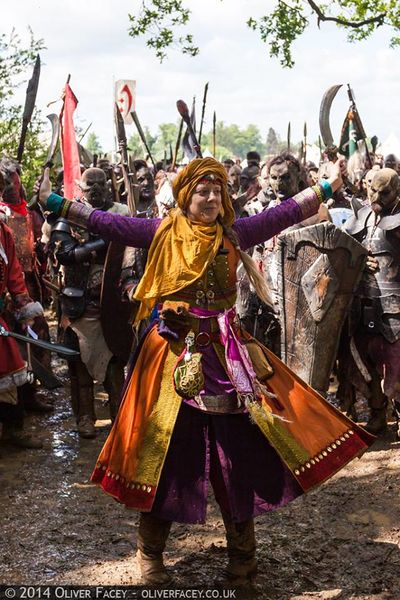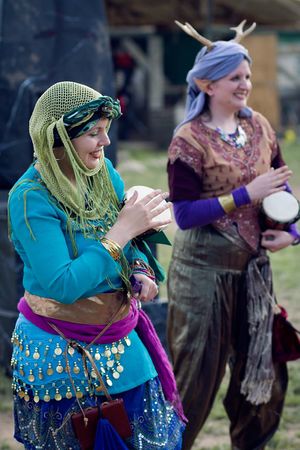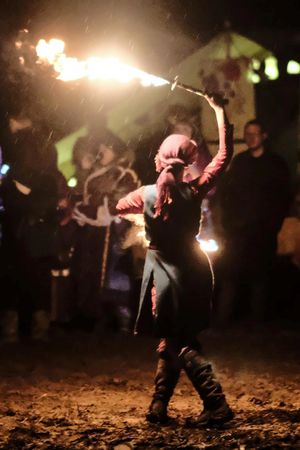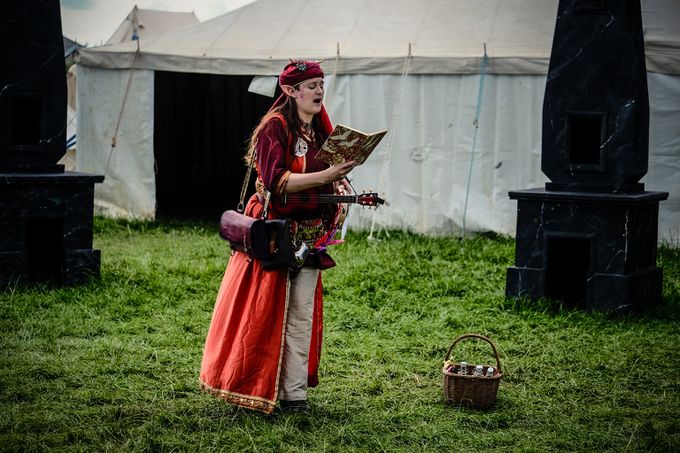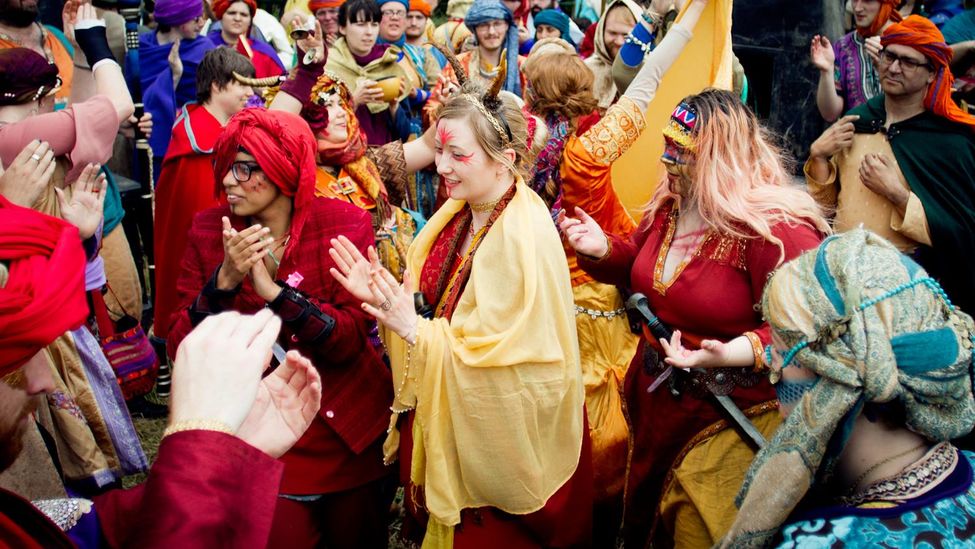The Brass Coast magical traditions
No edit summary |
mNo edit summary |
||
| (34 intermediate revisions by 7 users not shown) | |||
| Line 1: | Line 1: | ||
{{CaptionedImage|file=FreebornMagician.jpg|align=right|width=400|title=Dust, Brass Coast Egregore, opening the Sentinel gate using traditional music, dance and audience participation.|caption=Freeborn magic is often bold, entertaining and dramatic.}} | |||
==Overview== | |||
[[Riqueza]], [[Erigo]], and [[Guerra]], the founders of the Brass Coast, were known as accomplished ritual magicians, and magic is a source of wonder and pleasure to the Freeborn. They expect people performing magic to entertain, and many Freeborn magicians will enhance their rituals with stage magic tricks simply to please the crowd. Some Freeborn learn a handful of non-magical sleight-of-hand tricks or illusions while a few entertainers specialise enough to develop a whole act. | |||
==Traditions== | |||
Freeborn ritualists practice a tradition that says ritual magic is the act of building up power from the participants and creating a connection to the Realms, rather than the more traditional assumption that the magician draws power down from the Realms to the world. As such, all their rituals attempt to include their bystanders as participants whether that is chanting, clapping or singing. | |||
Magicians of each tribe bring a unique perspective to their magical arts. | |||
* The [[Riqueza]] perform ritual magic using loud, rhythmic, energetic drumming. Riqueza commonly make extensive use of [[Night magic]], especially rituals that [[Night_magic#Intuition|grant intuition]], or [[Night_magic#Emotions|inspire passions]]. | |||
* The [[Guerra]] prefer physical movement combined with fire and light. Guerra often specialise in [[Day magic]], especially rituals that [[Day_magic#Divination|divine]] facts or [[Day_magic#Revelation|reveal]] truth. | |||
* The [[Erigo]] use a less energetic style, often accompanying their rituals with soothing, harmonious music. Morso than the other tribes, the Erigo generally expect to be recompensed for the magic they work. As adepts of [[Summer magic]] that aids warriors, and [[Autumn magic]] that can grant powerful [[enchantment|enchantments]] to [[fleet|fleets]] or [[business|businesses]] they are rarely short of customers. | |||
Most Freeborn ritual groups prefer to work magic at night, in the open air, in the same way the founders did. The tradition of [[astronomancy]] is particularly popular with Freeborn magicians, although some older covens use an eclectic blend of [[aspect_magic#Beast_Magic|beast magic]] and [[dramaturgy]] in their magic. | |||
==Hakima== | |||
While ritual magicians within a family are hardly unknown, the more powerful and organised magicians in Freeborn society are the [[hakima]]. These politically active covens view other Freeborn magicians as unsophisticated dabblers at best, and ignorant meddlers at worst. The hakima are highly skilled practitioners of ritual magic and custodians of magical lore handed down to them by the founders of the tribes. They are dedicated to preserving the integrity of the nation as a whole and regularly look to recruit competent ritual magicians from the tribes into their own circles. | |||
More than being just magicians, the hakima exemplify a connection to the founders of the tribes and the history of the Freeborn. They are traditionally held to be wise, able to perceive the larger picture more effectively than most Freeborn who are anchored in more mundane activities. They may be consulted when important decisions need to be made within a family, or when magical assistance is sought. They rarely wait to be consulted, however – a hakima is likely to be poking around any important business ready to offer a suggestion as to what to do next. | |||
==Family Magicians== | |||
Within a [[family]], there is often at least one individual who has made a more serious study of magic. These individuals accept a responsibility for teaching relatives who are interested in learning a few magical knacks and use their magic to help their family and harm their enemies as well as try to scry the vagaries of fortune and fate. These magicians tend to be practical, and often combine their study of magic with crafting or medicinal lore. | |||
It is much more common for a family magician to be an expert in [[spellcasting]], rather than ritual magic. That said, some larger families maintain a [[coven]] of ritual magicians who concentrate on providing [[enchantment|enchantments]] to aid their members. There is some rivalry between these family covens and the hakima. | |||
<row-fluid> | |||
<span12>{{CaptionedImage|file=FreebornDrumming.jpg|width=300|caption=Freeborn rituals often involve drumming,}} {{CaptionedImage|file=FreebornFlame.jpg|width=300|caption=dancing (sometimes with fire and light),}} {{CaptionedImage|file=Harmonious Freeborn.jpg|width=680|caption=or soothing, harmonious music...}}</span12> | |||
</row-fluid> | |||
[[Category: | {{CaptionedImage|file=Freeborn Crowd.jpg|center|width=975|caption=...but they should all involve the audience.}} | ||
[[Category:Magic]] | |||
{{Brass Coast Links}} | |||
Latest revision as of 14:08, 16 February 2024
Overview
Riqueza, Erigo, and Guerra, the founders of the Brass Coast, were known as accomplished ritual magicians, and magic is a source of wonder and pleasure to the Freeborn. They expect people performing magic to entertain, and many Freeborn magicians will enhance their rituals with stage magic tricks simply to please the crowd. Some Freeborn learn a handful of non-magical sleight-of-hand tricks or illusions while a few entertainers specialise enough to develop a whole act.
Traditions
Freeborn ritualists practice a tradition that says ritual magic is the act of building up power from the participants and creating a connection to the Realms, rather than the more traditional assumption that the magician draws power down from the Realms to the world. As such, all their rituals attempt to include their bystanders as participants whether that is chanting, clapping or singing.
Magicians of each tribe bring a unique perspective to their magical arts.
- The Riqueza perform ritual magic using loud, rhythmic, energetic drumming. Riqueza commonly make extensive use of Night magic, especially rituals that grant intuition, or inspire passions.
- The Guerra prefer physical movement combined with fire and light. Guerra often specialise in Day magic, especially rituals that divine facts or reveal truth.
- The Erigo use a less energetic style, often accompanying their rituals with soothing, harmonious music. Morso than the other tribes, the Erigo generally expect to be recompensed for the magic they work. As adepts of Summer magic that aids warriors, and Autumn magic that can grant powerful enchantments to fleets or businesses they are rarely short of customers.
Most Freeborn ritual groups prefer to work magic at night, in the open air, in the same way the founders did. The tradition of astronomancy is particularly popular with Freeborn magicians, although some older covens use an eclectic blend of beast magic and dramaturgy in their magic.
Hakima
While ritual magicians within a family are hardly unknown, the more powerful and organised magicians in Freeborn society are the hakima. These politically active covens view other Freeborn magicians as unsophisticated dabblers at best, and ignorant meddlers at worst. The hakima are highly skilled practitioners of ritual magic and custodians of magical lore handed down to them by the founders of the tribes. They are dedicated to preserving the integrity of the nation as a whole and regularly look to recruit competent ritual magicians from the tribes into their own circles.
More than being just magicians, the hakima exemplify a connection to the founders of the tribes and the history of the Freeborn. They are traditionally held to be wise, able to perceive the larger picture more effectively than most Freeborn who are anchored in more mundane activities. They may be consulted when important decisions need to be made within a family, or when magical assistance is sought. They rarely wait to be consulted, however – a hakima is likely to be poking around any important business ready to offer a suggestion as to what to do next.
Family Magicians
Within a family, there is often at least one individual who has made a more serious study of magic. These individuals accept a responsibility for teaching relatives who are interested in learning a few magical knacks and use their magic to help their family and harm their enemies as well as try to scry the vagaries of fortune and fate. These magicians tend to be practical, and often combine their study of magic with crafting or medicinal lore.
It is much more common for a family magician to be an expert in spellcasting, rather than ritual magic. That said, some larger families maintain a coven of ritual magicians who concentrate on providing enchantments to aid their members. There is some rivalry between these family covens and the hakima.
Further Reading
Core Brief
Additional Information
